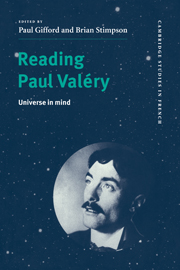Book contents
- Frontmatter
- Contents
- Contributors
- Abbreviations
- Introduction
- PART 1 SELF-SCIENCE
- 1 Towards a biography of the mind
- 2 Thinking-writing games of the Cahiers
- 3 Paradigms of the self: Valéry's mythical models
- 4 The fascination of science
- 5 An art of rethinking: Valéry's ‘negative philosophy’
- PART 2 SELF-WRITINGS
- PART 3 BODY, MIND, WORLD
- Conclusion
- Bibliography
- Index
- Cambridge Cultural Social Studies
3 - Paradigms of the self: Valéry's mythical models
Published online by Cambridge University Press: 04 August 2010
- Frontmatter
- Contents
- Contributors
- Abbreviations
- Introduction
- PART 1 SELF-SCIENCE
- 1 Towards a biography of the mind
- 2 Thinking-writing games of the Cahiers
- 3 Paradigms of the self: Valéry's mythical models
- 4 The fascination of science
- 5 An art of rethinking: Valéry's ‘negative philosophy’
- PART 2 SELF-WRITINGS
- PART 3 BODY, MIND, WORLD
- Conclusion
- Bibliography
- Index
- Cambridge Cultural Social Studies
Summary
‘Je cherche mon secret’ (‘I'm looking for my secret’) (CIV, p. 154): in a notebook of 1901 this arrestingly isolated statement indicates the central thrust of self-scrutiny and self-elucidation which had already, during the 1890's, provided the focus of Valéry's creative energies, and which underpins the entire framework of his subsequent thought and writing. Alongside this cognitive goal, reciprocal to it in reflexivity, runs an imperative of self-construction, which will equally remain constant; as late as 1943, the major motif is still ‘(se) Faire — ou (se) refaire’ (‘Making — or remaking — [oneself]’) (C, xxvii, P. 731).
In the light of this continuity of reflexive reference, it might seem surprising that, from the earliest years of the ‘System’, Valéry should have sought models of action and thought externally, in a number of great artists, thinkers or statesmen (Leonardo da Vinci, Descartes, Tiberius and Napoleon), as well as in certain geographical points of reference (such as Bismarck's Germany or the Yalou river in China), and in certain invented myths (such as ‘Monsieur Teste’). The recourse to these external sources creates a potentially uneasy relationship between the necessity of concentrating investigation on the self and the presence and persuasion of the various external reference points in which this enterprise is grounded. Yet from the earliest stages of Valéry's work, an acute self-awareness co-exists harmoniously with a quest for consciousness externally directed towards certain characteristic landmarks of Western civilisation.
- Type
- Chapter
- Information
- Reading Paul ValéryUniverse in Mind, pp. 53 - 69Publisher: Cambridge University PressPrint publication year: 1999

